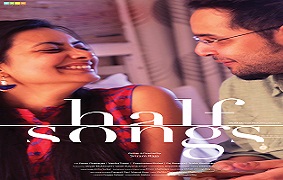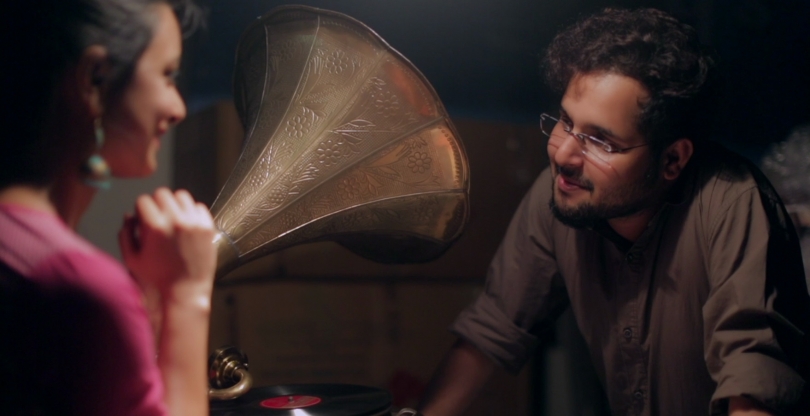|
|
||
|
Pro Tools
FILMFESTIVALS | 24/7 world wide coverageWelcome ! Enjoy the best of both worlds: Film & Festival News, exploring the best of the film festivals community. Launched in 1995, relentlessly connecting films to festivals, documenting and promoting festivals worldwide. Working on an upgrade soon. For collaboration, editorial contributions, or publicity, please send us an email here. User login |
Half Songs, Review: Melodies of nostalgia, dew-drops of sublime love
Half Songs, Review: Melodies of nostalgia, dew-drops of sublime love A simple tale, with few characters, executed with wholesome grace, Half Songs strikes a chord with its theme of incomplete, or ‘half’, human relations and endeavours, in the backdrop of modern urban life, juxtaposed with an era just gone by. A fresh, new team brings a dew-drop quality to the images and performances. No real hero or heroine, no comedian, no villain, no real character actor, no item numbers, but yes, there are songs galore, even if they are half-songs, written and sung by members of the cast. Shweta (Vartika Tiwari) returns to Mumbai from Shimla, after collecting her things and an old, broken gramophone, the vintage giant cone-speaker His Master’s Voice type. She has just broken-up with her boy-friend, Amit, to be with whom she had moved to Mumbai in the first place. Her flat-mate Sophie (Srishti Wadhwani) has found her a job at Metro Music, an online music magazine. Editor Tarun (Raj Banerjee) assigns her to a story about a music shop called Melody’s, which is about to down its shutters, after sixty years in the business. The shop is run by Vivek (Emon Chatterjee), Tarun’s junior in college, who has just completed his M.B.A., and is owned by his maternal uncle, Mama (Purushottam Mulani). Vivek is shy and reticent. A musical prodigy, he can play the guitar and compose, but he’s given up on his music for no clear reason. As the feature article progresses, Vivek repairs her broken gramophone, while Shweta, egged on by Mama, succeeds in getting Vivek to pick-up the guitar and play some of his compositions. He insists that all his songs are half complete, while Shweta finds them full and complete. Through an exchange of SMSs, the two begin to get close. One day, Shweta takes Vivek to an idyllic spot in the middle of Mumbai, with a spring flowing and nature at its romantic best. She speaks her heart and says that contrary to popular belief, she thinks pain does not give birth to art, for only pain will emanate from pain. They spend a whole day and night together, just talking and enjoying some of Vivek’s songs. Later, one day, Shweta sends him a text saying she is in love with his songs. He replies that he is in love.
Written, directed and edited by Sriram Raja, Half Songs takes its title very seriously, and almost everything is ‘half done’ in the film. Everybody has half a name (first name only); Mama is denied even that luxury. The broken gramophone is a half hark-back to the golden age of music on shellac and vinyl, while the restored player takes us forward to the present, where the old and new can co-exist, half and half. Shweta is half-reconciled to her “bad break-up”, unsure whether falling in love, while the wound is fresh, is the right thing for her. Vivek is unsure about his own talent and writes/composes half songs for reasons unknown. Melody’s is half open, because it is about to close down in a few days, after a closing sale. But then all the records will be stored in Mana’s huge mansion, and the store might even go online, so it is never really going to close down. Mama has a back story, wherein he fell in love with one of his customers and could only half express his feelings (not even half, really). Even Tarun and Sophie seem to have half-conspired to get Vivek and Shweta together. When Vivek apologises for his textual declaration of love, it is half a step backward, but Shweta responds with her half step. Half Songs is also about complementing and counter-balancing. If Shweta had a bad break-up, she has a great room-mate to stand by her. If Vivek’s parents separated when he was a boy, he had a loving uncle who raised him. Whereas he is unmotivated about his musical prowess and incomplete works, Shweta finds Vivek just perfect. If the age of analogue sound is passing away, with Talat Mahmood and Pakeezah LPs becoming collectors’ items, and ‘In old New York’ a ditty dating generations ago, a sublime love is blooming, courtesy the mobile phone and textual exchanges. Most dialogue is natural and seems to have been either written by the characters themselves or with the actors in mind. Vivek’s “Actually, I do mind” in response to Shweta’s “Do you mind if…?” is a good example. Also note that Vivek repeats Shweta's questions, as if he was biding his time to frame an answer. Everybody speaks at a normal, conversational pitch. Generous use is made of English, which never strikes a discordant note, given the English publication and the MBA context. Hindi grammar is, however, wayward at three or four places, with gender and singular/plural construction going awry. Deft directorial touches surface regularly, like when Sophie is trying to get Shweta to admit that she likes Vivek, and Shweta says a lot without saying anything. Rain and rain-drops are used as a motif as if to suggest that the barren world of Shweta is now suffused with the elixir of true love. Rain and storm are used as cutting points too. Loud percussion from a procession passing by seems to replicate the inner tumult of Vivek, who is seated at his window. Shweta ponderously runs her fingers along her cup as her mind goes in circles, and in the restaurant, where they are seated, a waiter pours cream into a coffee cup, making a heart-shaped pattern. As a debut directorial effort, Sriram Raja deserves a pat on the back. That he chose to limit the film’s length to 77 minutes is a sign of cinematic maturity. Mama’s track is, however, only half-convincing, what with the reference to ‘Chalo ik baar phirse’, Sahir’s immortal poem from Gumrah, as the ‘theme song’ of that film, epitomising his own love story that never was. The characters live in their own universes, with little or no back story or interaction, other than what is essential for the plot. Anything extraneous is avoided, but maybe some sense of the milieu would have added to the credibility of the characters. Some attempt is made to give it the Mumbai/urban feel, with change-over shots of the city, both day and night, as cutting points. Then again, Raja could have tightened the script even more and made it into a short film or a TV episode! Indian Idol fame Emon Chatterjee (a real-life musician) and Vartika Tiwari (a National School of Drama alumnus) are so much in character: Emon’s self-conscious, recurring look-aways, his use of the cigarette as a prop, Vartika’s big, vulnerable eyes and simmering pain, even as she seems to guide the relationship along. Emon is in fine form as a singer too, except the hint of a nasal tinge in the higher notes. As a song-writer, Vartika reveals herself to be a poet of no mean merit. Srishti Wadhwani (diploma in acting from the Film and Television Institute of India) as the extrovert soul-mate is the ideal woman you would like to have around in a situation like this. Raj Banerjee is well-used in a small role. Purushottam Mulani is just a bit awkward and the least credible of the five main characters. It is pompous of him to say that had Melody’s not been there, there would not have been no musicians. Why does Vivek pick-up the guitar and sling it across his back although he still has to attend to a few things at the shop before heading back home? Deyali Mukherjee’s production design is designed for a small budget affair, without any stars. The shop could have been better established. Almost all her camera-work is hand-held, and it is not always smooth. One scene in the balcony, when Shweta and Sophie are talking, is shot from an awkward angle and leads to a contrived cut. Wherever the camera s steady, the results are far better. Incidentally, Deyali is an architect and painter and holds a diploma from the Film and Television Institute of India in Art Direction and Production Design. She is a producer on this film too. Her own debut film as director, Teen Muhurat (2017), was recently shown at the Third Eye Asian Film Festival, and widely appreciated. It was produced and edited Sriram Raja, had Vartika and Raj Banerjee in its cast, and lasted all of 70 minutes. This Raja-Mukherjee partnership, solemnised in real-life, is sure going places in reel-life too. After successive, commendable outings in 2017 and 2018, I have full hopes from the Half Songs team in 2019. Rating: *** ½ Trailer: https://www.youtube.com/watch?v=MIZkj7kFYJY&feature=youtu.be 01.01.2019 | Siraj Syed's blog Cat. : Deyali Mukherjee Emon Chatterjee In old New York Pakeezah Purushottam Mulani Raj Banerjee Sriram Raja Srishti Wadhwani Talat Mahmood Teen Muhurat Vartika Tiwari Independent FILM
|
LinksThe Bulletin Board > The Bulletin Board Blog Following News Interview with IFTA Chairman (AFM)
Interview with Cannes Marche du Film Director
Filmfestivals.com dailies live coverage from > Live from India
Useful links for the indies: > Big files transfer
+ SUBSCRIBE to the weekly Newsletter Deals+ Special offers and discounts from filmfestivals.com Selected fun offers
> Bonus Casino
User imagesAbout Siraj Syed Syed Siraj Syed Siraj (Siraj Associates) Siraj Syed is a film-critic since 1970 and a Former President of the Freelance Film Journalists' Combine of India.He is the India Correspondent of FilmFestivals.com and a member of FIPRESCI, the international Federation of Film Critics, Munich, GermanySiraj Syed has contributed over 1,015 articles on cinema, international film festivals, conventions, exhibitions, etc., most recently, at IFFI (Goa), MIFF (Mumbai), MFF/MAMI (Mumbai) and CommunicAsia (Singapore). He often edits film festival daily bulletins.He is also an actor and a dubbing artiste. Further, he has been teaching media, acting and dubbing at over 30 institutes in India and Singapore, since 1984.View my profile Send me a message The EditorUser contributions |





























